All 4 entries tagged Corruption;
View all 5 entries tagged Corruption; on Warwick Blogs | View entries tagged Corruption; at Technorati | There are no images tagged Corruption; on this blog
January 01, 2023
Corrupt Lives? No. 1: Valentine Jones, ‘The Prince of Peculators’
Corrupt Lives 1: Valentine Jones, ‘The Prince of Peculators’
This is the first in a series that uses historical case studies to raise ethical questions, relevant to today, about corruption, anti-corruption and good governance.
Are people intrinsically corrupt or are they corrupted by others and the culture of corruption in which they find themselves? What is the difference, for a government contractor, between a fair profit and one that exploits the public purse, particularly during a time of national emergency such as a war, when there is a need for urgent supply of services and goods? How far might political considerations shield those who are intent on exploiting their public offices for private gain? These are the questions raised by the career of Valentine Jones.
When Jones had been appointed in 1795 as the commissary-general and superintendent of stores for the army based in the Leeward Islands in the West Indies, it was ‘supposed with clean hands.’ He had ‘served in divers public situations of credit, trust and responsibility’ in the West Indies, acquitting himself ‘with general satisfaction and approbation’. When the government gave him his role overseeing the logistical supplies for soldiers, he had been expressly told by George Rose, the treasury secretary, that he should not ‘derive the smallest advantage, in any shape or mode whatever, from your situation beyond your pay, on pain of instant dismissal'. Rose had sent the letter because he was ‘aware of the importance of securing to the public the services of respectable men in a part of the world where it had been found so difficult to check or correct abuses’. Initially Jones seems to have understood this and had written to his assistant commissary, Michael Sutton, to ensure ‘the proper application of the funds entrusted at any time to you, and the frugal expenditure of public money’.
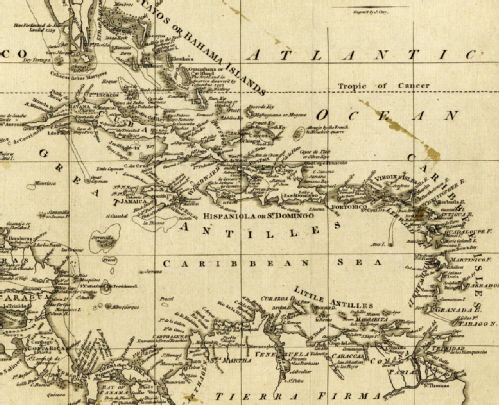
1781 detail from a map of the Caribbean © The Trustees of the British Museum
But as early as 1797 there were warning signs. That year Rose wrote to Jones censuring him for ‘the serious and alarming Inconveniences occasioned by the immense Sums’ of public money he had drawn down ‘without any Notice or Warning whatever’. Although government acknowledged that conditions of war might make it impossible for him to submit ‘regularly detailed Accounts’, this did not mean that he could simply abandon ‘vouchers’ (paper receipts) altogether or neglect to provide ‘a strict Account’, as well as proof of the going market rate for goods, ‘as it essential the Public should be guarded against Waste or Fraud’. What Jones had been charging for rum ‘appears enormous’ – he had spent £376,000 in just ten months on spirits and other provisions. He was warned that his tenure of office was under review.
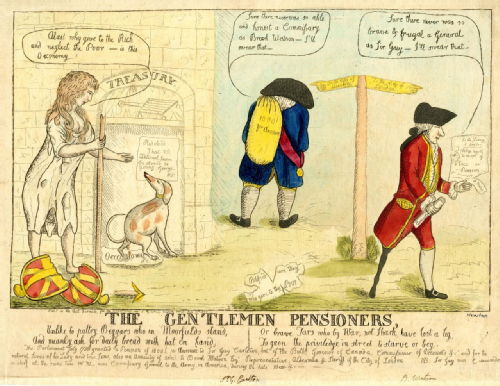
The Gentlemen Pensioners (1786), a satire showing Britannia impoverished by war and the profits made by an earlier commissary-general of Canada, Brook Watson, who was widely thought to have profited from the American war. His leg had been bitten off by a shark, hence his wooden peg. © The Trustees of the British Museum
Jones had conflicts of interest that undermined his impartiality. He was the son of a Barbados wine, rum and sugar merchant whose relatives ran a thriving import company in Belfast. Mercantile business ran in his blood and commercial considerations seem to have quickly got the better of him. He was approached by Matthew Higgins, who already enjoyed contracts for the armed forces and used an intermediary, Hugh Rose, to broker the deal (Rose was allowed a quarter of the profits, Higgins the other quarter, and Jones took half). Jones’s profits were also boosted when he established a ‘house in America, consisting of the names of Bennett and Carey; and with that house at Philadelphia he transacted this business’ of profiting from supplies there.
When in 1802 the government in Britain began investigating rumours, Jones had written to his successor, John Glasfurd, asking him to ensure that his accounts tallied with Jones’s, a request that he asked him to keep secret, ‘not that I should fear fair and candid investigation,’ for he was ‘conscious that our proceedings had not the evil intention that our judges believe; but I have already seen too much ill-will on this side of the water [ie in England] not to suspect foul play on the other.’ He even recommended a formulation for Glasfurd to employ to evade questions: ‘one general answer in your power… is, that you cannot remember the points of business so long gone by’.
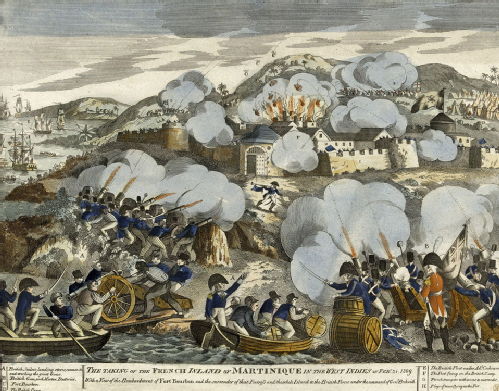
'The Taking of the French Island of Martinique in the French West Indies on Feby 24th 1809'. Coloured woodcut, published by G Thompson, London, 17 June 1809., Public domain, via Wikimedia Commons
In 1809 Valentine Jones was, finally, tried for ‘a corrupt bargain’ with Matthew Higgins. The latter had agreed to pay Jones a share of the profits he made on contracts for supplying the 30,000 troops stationed there in the 1790s. In March 1797 Jones had received £153,273 West Indian money, roughly £87,000 in sterling, over just a ten-month period. His case illustrates the difficulty of monitoring expenditure far away from the metropolitan gaze. The Attorney-General said that since Jones’s abuses had taken place ‘at a distance from the eye of those who have an immediate interest in preventing practices, frauds are easily committed; and it is very difficult when they have been committed to detect them.’
Jones’s defence argued that although he had been charged with ‘a breach of public trust’, he had exercised other situations of public trust in the West Indies ‘in all of which he had conducted himself with unblemished integrity’. Indeed, character witnesses called him ‘a very correct man’. But the Attorney General countered that
men who in other respects may conduct themselves honourably and uprightly towards those with whom they have communication, feel themselves unrestrained in any transactions which they may have with the public, and suppose that neither their character for honour nor integrity is impeached by practising the grossest frauds, provided those frauds affect only the public purse.
The impersonality of the ‘public’ thus seemed to liberate corrupt inclinations that were constrained by personal relationships.
The defence claimed that Jones had simply enjoyed lawful profits:
though in point of law it is not to be justified, in point of practice we know, it has happened, that men who have meant to do honestly and fairly have become interested with those who have provided the supplies for the public service upon a feeling, however false, and upon a footing not to be justified, but believing that if they merely shared in the fair profits, they committed no offence.
Thus technical illegality was not seen as such if the profit was merely a ‘fair’ one. The prosecution nevertheless showed that Higgins had made 30% profit, which was excessive.
Jones’s illicit profits had been unearthed by the commissioners of military enquiry, and his prosecution was hence an apparent victory for successful regulation by a watch-dog. The commissioners found that Jones may have got into bad habits when acting as clerk to the deputy paymaster in the West Indies, Mr Graeme, who profited on the rate of exchange on the public money he received (he was deputising for an absentee post-holder who pocketed the £400 salary). Graeme had been succeeded by Hugh Rose (no relation of George), who had continued the practice of profiting from any money made when the exchange rate was higher than its average, but also invested public money in produce, hence the contract with Higgins. The inquiry revealed a world in which a network of contacts was important but also one where making use of public money for private gain, and mixing public and private interests, were considered a routine practice.
The commissioners also found that it had been relatively easy to get away with ‘a regular and unchecked system of peculation, carried on in the most unblushing manner’. This in turn raised questions for the commissioners, or the predecessors. Critics said that they were an expensive and largely ineffective board that had failed to act even when abuses had been revealed. Indeed, vast sums of public money in the West Indies – over £7m for St Domingo alone - remained unaccounted for. Even the officer established as a check to corruption had become instrumental in it: instead of going to the West Indies, as he had been ordered, Isaac Phipps had employed deputies and then received half of whatever his deputies illicitly made in back-handers.
This complicit negligence had allowed Jones to develop ‘by means of combinations and intricacies almost impervious, an overruling and high injurious influence over the whole transactions of the public’ extending into ‘a far-extended system.’ Indeed, Jones profited every which way, since he was officially paid a good salary (£1000) and a 5% commission on whatever supplies he handled. The trial showed that he had defrauded the state of at least £87,000, though the likely figure was much higher.
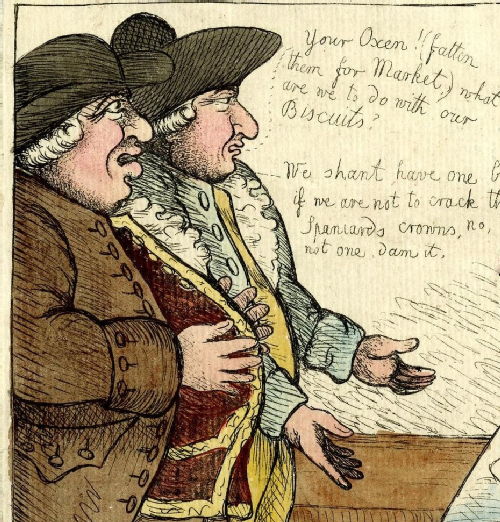
Navy Victualler and Contractors(1790) © The Trustees of the British Museum
Jones, nicknamed the ‘Prince of Peculators’ by one periodical, was given a three-year prison sentence, which the judge said was necessary ‘to prevent future peculation’ (peculation is an older word for embezzlement of public money by one entrusted with it). But he was not made to repay the money he had purloined and hence the leniency was criticised. Indeed, the press made Jones’s case a cause célèbre. In 1817 the radical author and publisher William Hone, facing trial for his own attempts to satirise government corruption, fumed against Jones as a ‘defaulter’ who had got away with his crime.
Hone showed that Jones was part of a gang of men, all loyal to Prime Minister William Pitt and shared anti-reform sentiment. Thus Hone linked Jones to a network of Pittite peculators. These included Oliver De Lancey, who had defaulted on £97,000 but had been rewarded with a pension of £2000; Thomas Steele, the army paymaster who made use of £19,800 of public money for seven years, even though he remained a privy councillor and Kings Remembrancer of the Exchequer on a salary of £830; John Glasfurd, who had failed to account for a sizeable part of the £6m that had passed through his hands; Isaac Phipps (as deputy paymaster general in the West Indies), who defaulted on £70,000; George Villiers who ‘lived like a Nabob till he was found out’ and owed £280,000 by 1804; William Bassett Chinnery, who defrauded the government of £80,000 and ‘gave sumptuous dinners and entertainments and balls’ for his cronies; and Charles Greenwood, an army agent and ‘instrument of corruption’ who had an official salary of £530pa but cleared at least £60,000, in collusion with the duke of York, commander-in-chief of the army who probably shared the profits or at least borrowed heavily from him.
What united these men and others, Hone claimed, was their anti-reform politics and loyalty to Pitt. Thus ‘Under Mt Pitt, Corruption flourished as in a hot-bed, and all the robbers were loyal, every man of them’. Hone thus used the press, even when he was himself under prosecution, to claim that there had been a widespread loyalist conspiracy to defraud the nation and to cover this up. Hone sharpened his attack, predicting that things would end ‘in real reform, in revolution or in despotism.’ Hone identified another of the corrupt crew as Alexander Davison, a close friend and agent of Admiral Nelson – Davison will be the subject of another blog.
What then are we to make of Jones?
He had previously enjoyed a seemingly good record of public service but became corrupted when opportunity, a conflict of interest and a general culture of corruption coincided with a lack of oversight. The conflict of interest was inevitable because it was precisely Jones’s business connections that had made him useful to the government. Knowing this, the government needed – for him and the other contractors on whom they relied - to take additional precautions, particularly as oversight from thousands of miles away was difficult, especially during the war-time conditions of the wars against Revolutionary and Napoleonic France.
The case suggests that robust mechanisms need to be in place before an emergency places strains on the system that open the way to corrupt activity – a problem we have seen with the PPE scandals in the UK when unscrupulous private agents profiteered from the public emergency, apparently with government sanction because the urgency of need was thought to outweigh the need for proper safeguards. And the case also shows that oversight mechanisms can themselves become corrupted, requiring constant vigilance.
The conflict of interest also meant that deciding on a ‘fair’ profit for a government contractor was - and still is - essential. His contract stipulated 2.5% but he clearly saw this as inadequate and pushed it over ten times higher. Was 2.5% sufficient, given the challenges involved in the supply of commodities? This was a debate that the government of the day – and now, given the large profits (8-10%) made by private prisons, for example – shied away from. How far is the public always dependent on such private outsourcing and is their profit corrupt?
The Jones case uncovered a network of individuals lining each other’s pockets and united by a shared ideology that opposed reform to the system from which they benefited; and the suspicion was that they enjoyed political support. Whilst the investigations were proof that the ‘elite’ was not monolithic and could expose corruption within its own ranks, the limited penalties only served to intensify suspicion of a corrupt ‘system’ that was lenient on insiders. Prime Minister Pitt thus offered something of a failure of leadership: although not personally corrupt, many of those allied to him were, and his administration was unwilling to take sufficiently robust action against them, in part because such men were deemed necessary to the war effort.
Further Reading: The Derby Mercury no. 4019, 1 June 1809; Thomas Howell, Complete Collection of State Trials xxxi (1809-13), 251-336; The State of the Nation with Respect to its Public Funded Debt, Revenue and Disbursement (1798), ii. 318-9, Rose to Jones, 10 May 1797; The New Annual Register, or General Repository of History, Politics, and Literature, xxx (1810), 264-5; The Seventh Report of the Commissioners of Military Enquiry (1809); Jackson’s Oxford Journal 2930, 24 June 1809; The Examiner 78, 25 June 1809; The Reformists’ Register 11 Oct. 1817 in Proceedings against William Hone before his trials (1817); Cobbett, Political Register xvii. 127; Mark Knights, ‘”Was a laugh treason?”: Corruption, Satire, Parody and the Press in Early Modern Britain’ in Knights and Morton, The Power of Laughter and Satire in Early Modern Britain (2017); Knights, Trust and Distrust: Corruption in Office in Britain and its Empire 1600-1850 (2021); Mentoriana; or, A letter of Admonition and Remonstrance, to His Royal Highness the Duke of York, relative to Corruption (1807).
July 12, 2021
'Old Corruption' Revived?
Writing about web page https://www.historyandpolicy.org/policy-papers/papers/old-corruption-revived-lessons-from-the-past
Are we living in an age of ‘New Corruption’ and if so, are there any lessons from our past about what to do about it? ‘Not since the Victorians abolished patronage with open competition has any government so ruthlessly ushered its placemen into every nook and cranny of the public realm’, argues Polly Toynbee [Dido Harding to head the NHS? Her position would be untenable | Polly Toynbee | The Guardian]. She implicitly refers to the mid-nineteenth century waning of ‘Old Corruption’ after an intense period of reform, and the recent revival of old practices.
‘Old Corruption’ – a term coined in the 1830s – was characterised by a ‘system’ of corrupt institutions and practices that diverted public money into the pockets of a political and social elite who distributed offices amongst their friends and family in order to advance their own profit. This article for History and Policy explores how far Old and New Corruption resemble each other; what reforms worked in the past; and what lessons can be learnt from this earlier history.
Here is a short summary of some of its conclusions
- Old Corruption taught us that neither public office nor a contract for outsourced public services should be obtained by patronage, patrimony or partisanship; but also that such forces are remarkably powerful, enduring and difficult to constrain.
- Both informal and formal restraints are necessary to attempt to do so. We need i) a vigorous and widespread debate on public ethics, particularly around issues of self-interest and accountability ii) robust, formal institutions with a remit for reform that remain independent from the executive iii) leadership demonstrating integrity.
- Some of the formal architecture of, and principles underlying, restraint already exist, the legacy of the struggle with Old Corruption; but they need to be protected from erosion and we also need to think about how to meet new challenges.
- We should view corruption not just as an issue of individual moral failing but as a systemic one in which many of our current institutions are interconnected and ripe for wholesale review.
- Anti-corruption is a long-term and on-going process but there are short-term measures that could help. One would be to increase the barriers and constraints on the ways in which vested interests influence public life and seek to determine the public interest.
- Crises and large-scale government spending increase both the opportunities for corruption and (with the consequent tax rises necessary to fund it) the public pressures for reform.
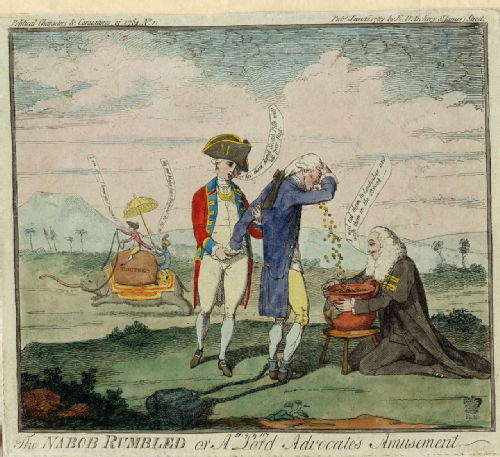
A satire of the ‘nabob’ (an anglicisation of the Indian word for prince), the rapacious Sir Thomas Rumbold, here neutralising his prosecution by showering money into a pot held by a government minister, Henry Dundas. Dundas was himself accused of creating a patronage network of Scottish MPs who would do the government's bidding.© The Trustees of the British Museum
November 28, 2020
Crony Contracts
In the pre-modern period appointments to office and awards of government contracts were often based on patronage, ‘friendship’, nepotism and sometimes straightforward exchanges of money. Are we in danger of slipping back into a seventeenth or eighteenth century world? When even a reporter from the Daily Telegraph thinks that the Tory government emits a ‘stench of corruption’, we should take this question seriously [Madeline Grant, BBC Andrew Marr Show, 22 November 202].
Emergencies, such as wars or pandemics, open the coffers of the state. The need to support the state’s efforts in a moment of need justifies very high levels of spending but then seems to foster loose or self-interested handling of public money that destabilise notions of fair profit, the balance between the public and private interest, and practices of accountability. Cronyism and corrupt contracts become far more possible.
In the seventeenth and eighteenth centuries Britain was engaged in huge expenditure on war. Civil war in the 1640s raised unprecedented sums of money but also headaches about accountability. The parliamentary forces ranged against the royalists created the first system of parliamentary committees scrutinising public expenditure, though there were frequent allegations that money disappeared into the hands of private individuals profiteering from the crisis and officials who abused their power to advantage themselves or their friends.
The second revolution of the seventeenth century, in 1688, propelled Britain into war with France that lasted, more ‘on’ than ‘off’, for the next 125 years. War became increasingly global in nature, as colonisation meant conflict in Europe spread across the world, and consequently state debt increased in leaps each time tensions flared. Contracts were handed out to supply troops with clothing, food and drink, and to financiers to pay the armed forces overseas. But all this was accompanied by what many contemporaries regarded as large-scale corruption. And over a period of several centuries structures were put in place to properly audit the expenditure; to prevent conflicts of interest; to prevent public money from being siphoned off into private hands; and to hold individuals to account for their behaviour in office. The system creaked each time it was put under strain by largescale emergencies; and often further measures were put it place.
Ironically it was the early Tory party, which emerged in the later Stuart period, that worried about the corrosive effect of large-scale state funding that they saw as disappearing into the pockets of their Whig rivals. The first Tory party was in part formed around hatred of Whig profiteering and cronyism. Thus in 1712, towards the end of a long war with France that had seen the national debt rise to unprecedented levels, the Tories argued that partisan self-interest was undermining the national interest. Money, they argued, was being purloined by Whiggish City financiers who became wealthy on the backs of the taxpayer. The Tories prosecuted one of the leaders of the Whigs, the future Prime Minister Robert Walpole, for a corrupt contract awarded to cronies and with built-in kick-backs. Walpole was also said to have presided over an unaccounted hole in the public finances of £35 million. Walpole was slung into the Tower of London for 'a high breach of trust and notorious corruption'. Indeed, throughout his long tenure as prime minister the Tory rallying cry against him was that he corrupted government and the political system. Anti-corruption was a key part of what it meant to be a Tory.

This Tory satire of 1740 depicts Walpole as an overblown idol whose arse had to be kissed if one wanted to get a public office and who was associated, as the words underline, with ‘Corruption’, ‘Venality’, ‘Folly’, ‘Vanity’ and ‘Pride’. © The Trustees of the British Museum.
So it’s somewhat ironic that the Tories today should be the subject of numerous accusations that they award excessively lucrative contracts to cronies without proper scrutiny and fast-track deals for insiders; that they appoint officials to important posts without any public competition; and that ministers are allowed to breach the codes designed to ensure high standards in public life and may even have broken the law in the way they have disregarded due process.
Emergencies always test the systems of the state to prevent corruption, and historically those systems have needed adjustment if they are found wanting. Indeed, after most periods of emergency in the seventeenth and eighteenth centuries there was a period of review and reform, and often of significant public anger. We seem to be approaching one such moment again.
For a good discussion about the current dangers of corruption see the Mile End Institute discussion at https://www.youtube.com/watch?v=k27w9VRE1gI.
For a warning, from the former director of Transparency International, about the dangers of corruption in Britain see https://www.qmul.ac.uk/mei/news-and-opinion/items/corruption-in-modern-britain-the-warning-lights-are-flashing-red--professor-robert-barrington-.html
For the National Audit Office report on government procurement during the Covid crisis see Investigation into government procurement during the COVID-19 pandemic - National Audit Office (NAO) Report
Boris Johnson ‘acted illegally’ over jobs for top anti-Covid staff | Politics | The Guardian
May 24, 2015
Murdoch's Madras ancestor
In February 2015 the US Justice Department dropped an investigation into possible corruption at News Corp, after the UK phone-hacking and accusations that public officials had been paid for news stories. In May 2015 stories about alleged corruption in Nepal were the subject of a BBC documentary, in which it was suggested that money intended for relief efforts after the earthquake might be siphoned off. These two apparently unconnected stories are linked by an early nineteenth century scandal, involving News Corp’s boss Rupert Murdoch’s great great great grandfather, Robert Sherson, an East India Company official who was accused of embezzling money from a relief effort after a famine and then violent storms hit Madras in 1807. We have Sherson’s side of the story, since he had access to the press, and published several vindications of his conduct.

Robert Sherson had been appointed as Superior in the Grain Department, and supervised the food intended for the relief of 300,000 inhabitants affected by a famine. On 10 and 11 Dec. 1807 a violent storm tore the roof off the grain store, leaving it vulnerable to ‘the depradations of the starving multitude’. Sherson ordered a survey of what was left and ‘incautiously’ signed the estimate, ‘not suspecting public servants in whom he himself had been in the habit of confiding largely upwards of six years’. But the estimate was not believed by Sherson’s bitter enemy in Madras, Mungo Dick, with whom he had a long-standing dispute and, unluckily for Sherson, Dick had power over him as one of the members of the Committee overseeing his actions. Dick’s investigations concluded that the estimate of losses had been deliberately inflated and refused to accept that the mistake was an honest one. A Committee of Enquiry was set up by Governor Sir George Barlow, who, ‘the dupe of designing men’, appointed Dick as its chairman. The result was that on 10 Feb. 1808 Sherson was dismissed from his offices (he was deputy Customs Master, Assay Master, Director of the Government Bank, posts worth £4800 pa) under the charge of having fraudulently sold grain to the value of £12,000. Sherson was also accused of selling grain at higher prices than were authorised by the government and hence profiteering from the famine; and there were later accusations that he had attempted to bribe his assistant, a Mr Clarke.
Sherson’s defence was that he had done all he could to ensure an accurate estimate of the store had been made as quickly as possible after the story; and he refuted the charge of embezzlement, which rested on accounts drawn up by ‘the Mutsuddee or Hindoo Accountant’ who was Dick’s ‘creature’ and had allegedly doctored the accounts: ‘every one …knows the facility with which they may be mutilated. That nothing is more easy than by a dot or a scratch to add an hundred or a thousand even’ to the sums.’
When Sherson's case eventually came to court in 1814, the Supreme Court in Madras threw it out, arguing that frauds might have been perpetrated without his knowledge and that, in the opinion of the Lord chief Justice, ‘the whole amounted to nothing'. Another justice declared that if the matter had come before a British court Dick would have been jailed ‘as a perverter of justice’ and that he strongly suspected the accounts used against Sherson had been forged. Indeed, he thought it ‘astonishing, that [the Indian] Government could have listened to such a charge against a good and worthy servant, founded on infamy, fraud and conspiracy’. A third judge thought there was ‘not a scintilla of evidence beyond the opinion of Mr Cooke, founded on hearsay’. Sherson should leave court, he said, ‘freed from all suspicion of having failed in any manner whatever in his duty to his employers’. He was eventually reinstated and in 1815 the East India Company even voted him a present of 20,000 pagodas as recompense for his protracted suspension from office, and sent him back to India ‘with credit’.
The accusation against Sherson has all the hallmarks of a man with a personal grudge using a good opportunity to strike at a rival. The smear of corruption hung over him for a long time before being dispelled (and even after the judges’ ringing endorsement, suspicions about his earlier corrupt activity continued to circulate). On the other hand, Sherson had access to the press to clear his name and he also had powerful backers in the British Parliament. Seven years after he had been suspended, a Member of Parliament, Alexander Novell, waged a sustained campaign to have Sherson’s name cleared. The importance of access to politicians and the press may have been a lesson the family learnt well.
 Mark Knights
Mark Knights

 Please wait - comments are loading
Please wait - comments are loading
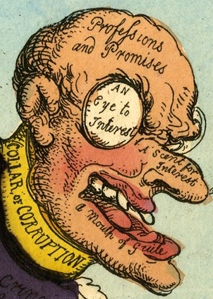
 Loading…
Loading…

